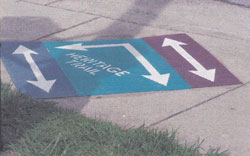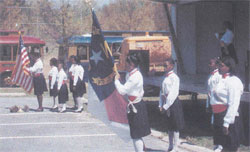East Winston Heritage Trails
Forsyth County, North Carolina
Source: Pedestrian and Bicycle Information Center (PBIC)

Start Point Marker for Heritage Trail and directional Markers for 14th street and Holland Trails.
Problem
Minority populations in Winston-Salem are disproportionately affected by obesity and resulting chronic health problems. In addition, many minority cultural sites were lost throughout the years to urban renewal.
Background
The Forsyth County Department of Public Health initiated the "Behealthy" Coalition in 1999 to address the burden of chronic diseases. Increasing physical activity among residents of Forsyth County is its main objective.
In the first few decades of the 20th century, Winston-Salem became home to a prosperous and growing black middle class where black-owned businesses and neighborhoods thrived. However, the expansion of RJ Reynolds Tobacco Company, Winston-Salem State University, interstate highways, and more, all led to the destruction of entire black neighborhoods.
Solution
With seed money from Beactive North Carolina, the Behealthy Coalition initiated a plan to develop several walking trail routes in historic neighborhoods in Winston-Salem. The Behealthy Coalition partnered with the City Department of Transportation, the City/County Planning Department, the Director of African American Programs at Old Salem, and the Society for the Study of Afro American History in Forsyth County to develop trail maps highlighting the history of seven different neighborhoods in Winston-Salem. The six trails range in length from 0.8 miles to 2.4 miles, and many educational, religious, and cultural institutions are highlighted on the trail map. The map also features safety tips and descriptions of the neighborhoods.

Flag presentation at the First Neighborhood Heritage Day, April 2002.
The city of Winston-Salem Department of Transportation assisted the Behealthy Coalition with finding a cost-effective and practical way to permanently mark the Heritage Trails. Preformed thermoplastic trail markers were used, each in a distinct color to correspond with the color designation on the walking trail map. A walker can enter a trail at any point and complete the trail loop by following the designated trail color.
The total budget was $7,526. Grants from Beactive North Carolina covered $7320, and a small donation of $206 from the City of Winston-Salem Department of Transportation covered the rest after funding fell short for the installation of trail signs. The majority of work required to complete this project came from partnered agency staff time and community member volunteer hours.
Results
Soon after completion of the project, the Women's Health Center of Excellence of Wake Forest University Baptist Medical Center (a Behealthy partner) received a grant to develop neighborhood walking groups as a means to build social capital among walkers and community decision-makers. The success of these walking groups led to a community-wide celebration of health, history, and heritage with the first annual Heritage Day. The event included outdoor games, a fruit and vegetable tasting station, a "walking health fair," free health screenings, and guided trolley tours of the historical Black Neighborhoods. In addition, the Coalition sponsors downtown lunch-hour walks, attracting up to 500 participants at a time.
Contact
Lynne Mitchell, Preventive Health Services Director
Forsyth County Department of Public Health
799 North Highland Avenue
Winston-Salem, NC 27101
(336) 727-2436 ext. 3890
mitchelm@forsyth.cc
Image Source
Institute of Transportation Engineers Pedestrian Project Award. Forsyth County Department of Public Health. http://www.ite.org/awards/pedproject/ppa087.pdf




